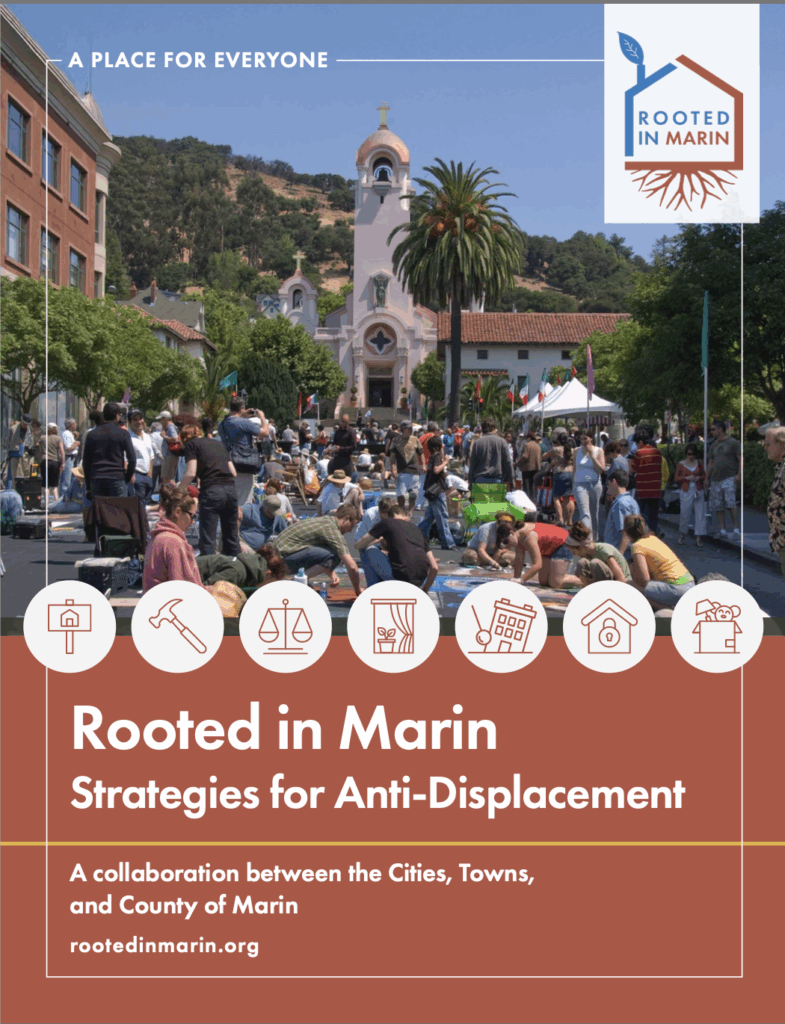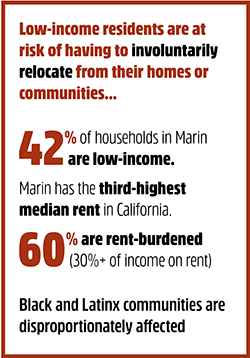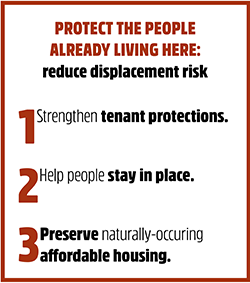Rooted in Marin: A Collaborative Effort Toward Anti-Displacement Policies
by Chris Logan, Partnership for Bay Future Fellow , County of Marin Community Development Agency
Before we lose diversity, workers, and quality of life… we must act now.
Rooted in Marin: Strategies for Anti-Displacement is a collaboration between the Cities, Towns, and County of Marin. Read or download the report here.
Low-income and rent-burdened households are at increasing risk of displacement
We hear a lot about the housing crisis and the urgent need to produce new units to meet the growing demand for housing. But getting a new housing development from concept to completion can take many years. Building new homes and apartments is important work that deserves broad support—especially in the face of limited funding and local challenges like site identification and slow entitlements. Meanwhile, 42% of households in Marin County are low-income, and the county has the third-highest median rent in California. Today, 60% of renters in Marin are considered rent-burdened, meaning they spend more than 30% of their income on rent. These residents face a growing risk of displacement— involuntary relocation from their homes or communities due to factors outside their control.


1. DIVERSITY IN MARIN IS AT RISK
42% of all households in Marin are low-income, meaning that they earn below 80% of the Area Median Income (AMI). That is only part of the story – Black and Latinx communities are disproportionately affected:
- 75% of Black households are low- income
- 61% of Latinx households are low-income
If these families cannot afford to remain in the county, we risk losing the diversity that enriches our communities—reducing opportunities for cross-cultural connection and learning, and diminishing the cultural and social fabric that makes Marin unique.
2. AN AGING POPULATION AND SHRINKING WORKFORCE
Marin is experiencing a decline in young working-age adults (25–44 years old). Young families and workers are increasingly priced out, leading to:
- Workforce shortages—64% of people who work in Marin now live outside the county
- Declining school enrollment, which has already led to school closures
- A reinforcing cycle that discourages younger populations from settling here
3. STRAINS ON MARIN’S QUALITY OF LIFE
The housing crisis is undermining Marin’s ability to provide the high-quality public services, schools, and amenities that residents expect. The combination of high housing costs and inadequate transportation infrastructure threatens the sustainability of our communities and our economy.
But we can do something about it
As we work toward increasing housing production, we must also protect the people already living here. Anti-displacement policies can serve as a buffer for tenants navigating economic pressures and help prevent forced relocation. Last election, some jurisdictions took a step in proposing some tenant protections. Although those specific measures weren’t passed, most Marinities agree that we need to act to reduce the displacement that is happening.
Three Key Strategies to Reduce Displacement Risk:
1. Strengthen Tenant Protections
- Create a Tenant Commission or Rent Board
- Enact a Local Just Cause for Eviction ordinance
2. Help People Stay in Place
- Establish landlord-tenant dispute resolution or mediation programs
- Provide tenants with counsel when going into eviction court. We must ensure they have the right to legal representation before an eviction case moves forward, and make this access free or, at minimum, affordable
- Expand access to rental assistance
- Consider rent stabilization measures
- Regulate utility cost pass-throughs to prevent hidden rent increases
3. Preserve Naturally Occurring Affordable Housing
- Implement a Tenant or Community Opportunity to Purchase (TOPA/COPA) policy

Invest in data: build the infrastructure to respond
A countywide rental registry would empower local jurisdictions to:
- Monitor rental trends
- Track changes in the housing stock
- Ensure that properties meet health and safety standards
This is essential infrastructure to support smart, equitable policymaking.
Where we are now
Thanks to the outreach efforts of Community Action Marin, we’ve held a series of community briefings, summarized in the “Pushed Out” report. We are now in the process of sharing findings with city and town councils across the county. These presentations are an opportunity to hear from elected leaders about their priorities and how they can support housing security.
What you can do
- Attend an upcoming presentation and make your voice heard in support of anti-displacement solutions. These two council presentations are currently scheduled. The Rooted in Marin report will be presented to each council, including an analysis of anti-displacement data and offering what potential policies could address the issue in Marin County. To become as fully informed on this process, please plan to attend one of these presentations.
- Reach out to your City Council Members and County Supervisor to express support for policies that help low-income and under-resourced families stay in Marin.
ROOTED IN MARIN
City Council presentations:
June 17, 7:00 pm
SAUSALITO CITY COUNCIL
Held at Council Chambers, 420 Litho Street.
June 18, 6:30 pm
LARKSPUR CITY COUNCIL
Held at Council Chambers, 400 Magnolia Avenue.
Together, we can root our values in action—and keep Marin a place where all can belong.
R E S O U R C E S
Explore the broad library of resources on our website including news, policy statements, advocacy, upcoming meetings, fact sheets and backgrounders on affordable housing – and the lack of it – in Marin. If you have any questions or suggestions, contact us here>>


You can be a part of MEHC’s important work by reading & sharing our monthly PERSPECTIVE newsletters, joining our weekly COMING UP IN HOUSING email list (signup here>>), participating in our advocacy campaigns, and also, if you can, by donating >> to help defray our expenses. Thank you.

